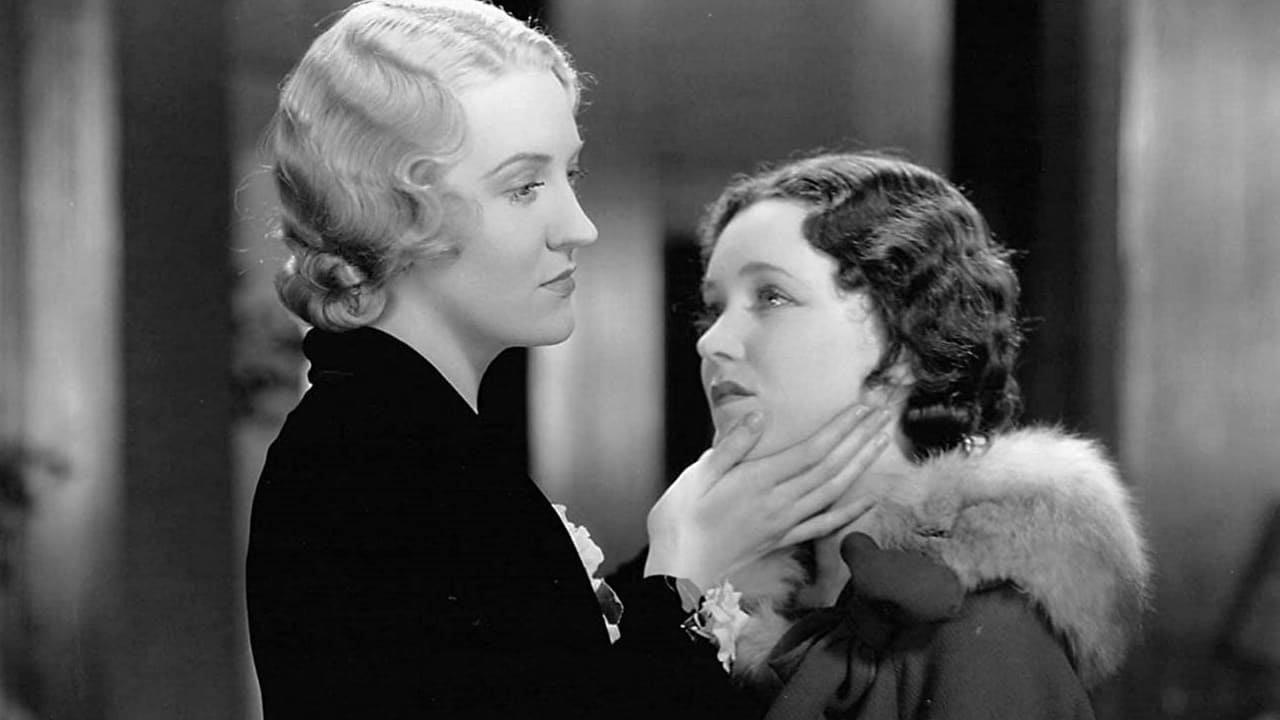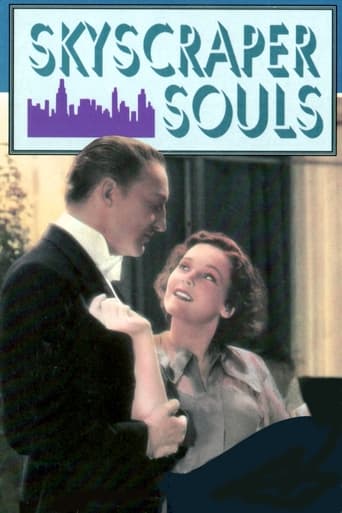

This was a great showcase for Warren William's pre-code amorality. He plays a financial wheeler dealer who apparently feels no need to examine his conscience or alter his slippery Roaring Twenties' ethics in the face of the Depression's financial pressures. In addition to the joy of seeing William strut his stuff as the owner of a new NYC building that's even taller than the Empire State Building, the viewer is allowed to gaze at some really interesting art deco touches, such as a swirling lobby floor shot from above by the masterful cinematographer, William Daniels, and, among other stylish set design details, the almost seamless doorways with a curved pattern that resemble 33 1/3 gold records cut in half, and, of course, the sleek Mr. William himself.However, for me, the most enjoyable thing about this film were the supporting players: Verree Teasdale, who gives a truly nuanced, sympathetic and ultimately poignant performance as William's longtime mistress and right hand gal. This role would probably not even exist once the production code took hold. She also lends her considerable elegance to this part in a series of lovely high end "working girl" outfits.Hedda Hopper--yes, before she took up her pen--who plays the bemused, estranged wife of Warren William who shows up occasionally to comment cynically on his behavior and to ask for some dough. Too bad Ms. Hopper didn't have more chances to play this sort of woman-of-the-world role. Perhaps we could've remembered her more vividly as a actress rather than a gossip columnist. She too is surprisingly elegant here.Edward Brophy, who plays an uncredited part as a besieged man on an elevator who interjects some needed earthiness and humor in the story whenever the rather earnest secondary leads, Norman Foster & Maureen O'Sullivan, threaten to annoy this viewer with their pallid pursuit of a banal skein of the story.Miss O'Sullivan, who was very early in her MGM career, injects her somewhat underwritten role with a fleeting vibrancy and self-delusion, but this unfortunately turns into an unattractive tendency to whine and simper about wanting to marry - as long as a fellow has a good bank account. This rather realistic attitude probably rang true to many in the Depression era audience, but the script never fully developed her character, unfortunately, and probably couldn't with such a large ensemble cast.Among the most ironic of situations is Jean Hersholt as a jeweler who in the process of doing something good - showing a girl (Anita Page) that she is good for more than sex, she is good for a lifetime of companionship - unknowingly kills somebody. The only person who knows cannot tell or rescue the person, still alive, or else that person will be admitting to a host of indiscretions to which they were a party. Thus this person just staggers away, lost.Catch it if you can. You'll notice many similarities to Grand Hotel, although this film came out first. It stars many of MGM's lesser players, and speaks more directly to American Depression era audiences than Grand Hotel ever could.
... View More***SPOILERS*** Having had built the biggest building in the world the 100 story Dwight Building it's creator David Dwight, Warren William,is now on the brink of losing it to his creditors, the banks, whom he owes 30 million dollars that he doesn't have. In fact Dwight is in far more trouble then that in having used the depositors in his bank, The Seacoast Bank, cash as collateral a big no no in the financial world; Using others people's money for personal gain.This can land Dwight being bars for a long long stretch!While all this is going on the happy go lucky Dwight is playing the field with his cute 20 year-old secretary the tea toting and innocent Lynn Harding, Maureen O'Sullivan, who's good friend and mentor, who in fact got Lynn her job, Sarah Dennis, Verree Teasdale, happens to be Dwight's personal secretary. It's Sarah who knows where all the bodies that her boss had destroyed over the years are buried!Even though Lynn is anything but interested in having an affair with her butt grabbing boss Mr. Dwight he manages to get her drunk on champaign one evening when she was working overtime in the office and corrupted her to the point when her equally obnoxious boyfriend bank teller, at Dwight's Seacoast Tank, Tom Shepard, Norman Foster,dumped her as well. In Tom feeling that Lynn felt that she was too good for him because he was just a commoner or working stiff.Back to business Dwight now with his back to the wall and facing total financial ruin, as well as jail time, he concocts this plan to wipe out all his debts as well as his enemies in the financial world. This is done with the cahoots of Dwight's partner in crime Hamilton, William Morris, who's plan is to push up the price of Seacoast Inc.to $350.00,from $250.00 a share, and then sell it leaving everyone who bought the stock, which includes his banker enemies, high and dry as well as wiped out financially.***SPOILERS*** This diabolical scheme on Dwight's part works to perfection leaving him in total control of his beloved, which he put his heart and soul as well as money into, Dwight Bulding but causes a good number of people who bought Seacoast inc to end up killing themselves. One of them being Harrington Brewster, Punnell Pratt, one of Dwight's banker friends whom he accused of pulling the stock sham that Dwight in fact pulled off! The final insult that Dwight tried to pull off was his attempt to take off with Lynn on a cruise to Europe and the warm and sunny Mediterranean while laving his loyal personal secretary Sarah Dennis out in the cold. This has Sarah blow her stack and finally blow Dwight away with the revolver he gave her as a present for Christmas. Knowing that she now has nothing to live for Sarah jumps off the top of the Dwight Building killing herself.P.S The movie does in fact have a happy ending with both Lynn and Tom trying the knot and Dwight's widow Ella, Hedda Hopper, selling the Dwight Building that cause all the pain and suffering in it.
... View MoreWill innocent young Lynn Harding (O'Sullivan) give in to rich man Dave Dwight's (William) predatory advances or will she settle for working-man Tom Shepherd's (Foster) marriage proposal. This is the height of the Depression (1932), so maybe being a toy for a rich man is better than barely hanging on in a house with kids. But then, Dwight is one ruthless conniver. We see how he's topped the business pile through heartless double-cross and market manipulation. But he's also charming, handsome, and very persuasive. It's a tough situation for the fetching young Lynn to find herself in.The movie itself would not work so well without the commanding presence of William who dominates even down to the sub-plots. It's his magnetism that keeps those rather weak sub-plots (Hersholt, Ratoff, Ford) from limping away from the core. Too bad that this fine actor died fairly young and is now largely forgotten. The cuddly O'Sullivan, too, shines in her role as the ingénue, showing how she could be both tough and winsome. No wonder Tarzan wanted her for a mate.The plot resembles Employee's Entrance (1933), where William played a department store tycoon as unsympathetic as his role here. Skyscraper's high point comes when the supremely self-assured Dwight lords his triumph over business rivals in a startling 3-minute soliloquy to superior ruthlessness. Business has no ethics or rules, he asserts. Thus, he won the battle for the skyscraper's ownership by playing the game more ruthlessly and cleverly than his opponents. So instead of complaining, they should learn the hard lesson he has taught them if they want to succeed in the world of high finance. It's as clear a statement of Darwinist principles as any movie of the day, and likely confirmed audience suspicions on the nature of the economic crisis then threatening them. Just as in Employee's Entrance, I expect the audience comes to grudgingly admire William's clarity at the same time he's feared and loathed. Perhaps there's also insight into the odd mass appeal of those political strong men like Hitler and Mussolini then on the rise.This is another of those pre-Code gems that deserves the kind of resurrection cable TV can give them. Note how casually marriage is treated by the upper echelon, especially by Dwight's little lesson on how physical separation guarantees a lasting partnership. Also, note how casually the innuendo drifts by, especially how a "Mrs. Kind", no less, has injured poor old Charlie Norton's back the night before. Then too, Dwight may be one heartless businessman, but he also pensions off ex-mistresses in pretty generous fashion. Unfortunately, honesty of this sort would soon disappear from the screen for decades courtesy the Motion Picture Code's effort at reinforcing the non-sexual and non-political in the face of increasingly restive Depression-era audiences.Nonetheless, this is a movie to catch up with, along with the equally revealing Employee's Entrance from the same period. It's also a good window into one of the finest neglected performers of his time and before he got trapped into too many lightweight vehicles, the compelling Warren William.
... View MoreMade before "the code" removed all "offensive" material from American movies, Skyscraper Souls combines the social commentary of a Warner Bros. film, the class of an MGM production, and the sleaziness of a pulp novel. Warren Williams, a great but sadly overlooked actor, is perfect as the nice-but-slimy David Dwight, bank entrepreneur, who has built a 100-story monument to himself and doesn't have the $30,000,000 to pay for it. How he gets the money and what happens to those who unwittingly fall into his trap, constitutes the main thrust of the narrative. The film is full of diverse characters, all trying to eek out a living in the towering Dwight Bldg. The many plotlines cross and criss-cross, and the end is more realistic than one would expect from a "Hollywood" film. Watch for it on TCM, or on Laserdisc, in the "Forbidden Hollywood" set.
... View More